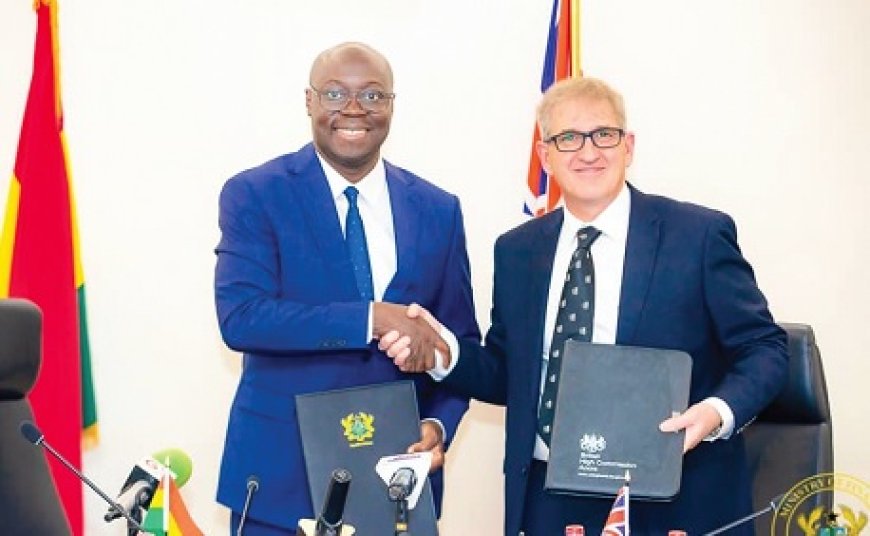Ghana, UK Seal 15-Year Debt Restructuring Deal, Clearing Path for Major Infrastructure Projects
JHNews || Ghana has struck a 15-year debt rescheduling deal with the UK, unlocking £170 million to revive five critical infrastructure projects. The move forms part of a sweeping external debt restructuring under the G20 Common Framework.

Accra, September 2025 — Ghana’s Ministry of Finance has finalized a landmark 15-year bilateral debt rescheduling agreement with the United Kingdom, a deal expected to ease fiscal pressures and reactivate critical development projects that have stalled for more than a year.
Terms of the Agreement
The arrangement restructures over US $256 million in debt owed to the United Kingdom’s export credit agency, UK Export Finance (UKEF). The deal falls under the G20 Common Framework, a global initiative that allows heavily indebted countries to renegotiate repayment terms with official bilateral creditors.
Under the new plan:
-
Repayments will be spread across 15 years, with a grace period on principal payments to free short-term cash flow.
-
Interest rates are being aligned with current international concessional benchmarks, significantly reducing Ghana’s debt-service burden.
-
The framework includes transparency clauses to reassure both the IMF and private creditors that Ghana is treating all lenders equitably.
Finance Minister Cassiel Ato Forson called the agreement “a critical step in Ghana’s economic recovery,” emphasizing that it complements the country’s US$3 billion IMF Extended Credit Facility and negotiations with other bilateral and private creditors.
Unlocking £170 Million for Projects
A direct result of the deal is the release of £170 million (about US $207 million) in previously frozen funding for five major infrastructure projects:
-
Bolgatanga–Bawku–Pulmakom Road Rehabilitation (Upper East Region)
-
Key arterial route for cross-border trade with Burkina Faso.
-
Construction has been stalled since late 2023.
-
-
Obetsebi Lamptey Interchange – Phase Two (Accra)
-
Designed to ease chronic congestion at one of the capital’s busiest intersections.
-
-
Kejetia Market Redevelopment (Kumasi)
-
Expansion of West Africa’s largest open-air market to modern, fire-resistant standards.
-
-
Komfo Anokye Teaching Hospital Maternity & Children’s Block (Kumasi)
-
A 750-bed facility to reduce maternal and infant mortality.
-
-
Tema–Aflao Road Corridor Upgrades (Greater Accra–Volta Regions)
-
Improves links to Togo and Benin, bolstering regional trade.
-
Work on these projects had slowed to a crawl after Ghana suspended external debt service in December 2022 amid balance-of-payments pressures and currency depreciation.
Broader Economic Context
Ghana’s total public debt stands at roughly GH¢658 billion (US $56 billion), or approximately 70% of GDP. Servicing that debt had been consuming more than 50 % of government revenues before the IMF program began.
-
The cedi’s sharp depreciation in 2022–2023 magnified the cost of dollar-denominated debt.
-
Inflation, which peaked above 50 % in early 2023, has since eased but remains in double digits.
The UKEF deal is one of several bilateral negotiations Ghana is pursuing with members of the Paris Club and other official creditors to achieve debt sustainability and meet IMF targets.
Next Steps and Oversight
The Ministry of Finance indicated that the Ghana Infrastructure Investment Fund and relevant sector ministries will coordinate with contractors to mobilize within the next quarter. Independent audits will track disbursements to prevent cost overruns and ensure timely completion.
UK High Commissioner Harriet Thompson welcomed the agreement, noting it “strengthens the UK–Ghana development partnership and provides a solid platform for future investment.”




 HENRY GERCHI
HENRY GERCHI 












